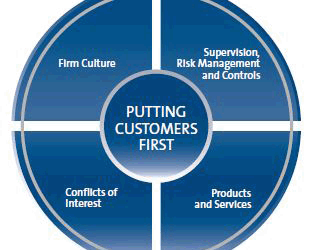
(TradersMagazine) BrokersDealers, get ready for your culture check close-up.
As FINRA examiners make their rounds this year, they will put firms’ culture under the microscope. Wall Street’s chief regulator is turning its attention to the tone set by senior leaders and supervisors, asking whether the culture they create supports compliance, risk management and ethical conduct throughout the brokerdealer organization.
The industry regulator last week published its annual letter outlining its examination priorities for the new year, putting the industry on notice that, along with firm culture, FINRA examiners will be looking broadly at issues around supervision and liquidity, as well as a host of other areas ranging from cybersecurity to how brokers work with elderly clients.
In a statement accompanying the exam-priorities letter, FINRA CEO Richard Ketchum explains that the focus on culture comes in response to the failure of too many firms to establish a compliance-driven ethos that rejects self-dealing and where brokers and advisors consistently place clients’ interests ahead of their own.
“Nearly a decade after the financial crisis, some firms continue to experience systemic breakdowns manifested through significant violations due to poor cultures of compliance,” Ketchum says. “In 2016, FINRA will be looking for firms to focus on their culture and whether it is putting customers first and promoting risk management adaptable to a changing business environment.”
Not One-Size-Fits-All
While FINRA says that it plans to “formalize” its method for assessing a firm’s culture in 2016, the industry regulator insists that it is not going to be overly prescriptive and hold brokers to a one-size-fits-all standard for what an appropriate culture should look like.
“Our goal is not to dictate a specific culture, but rather to understand how each firm’s culture affects compliance and risk management practices,” Ketchum says.
At the same time, FINRA is working toward a more objective set of criteria to evaluate the culture of a firm, and says that it will complete the review of incentives and conflicts of interest in the retail brokerage sector that it began late last year. Through those sweep exams, FINRA has been collecting information on how firms navigate conflicts of interest in areas like proprietary products and the compensation structure for registered reps.
The mechanism for evaluating a firm’s culture that FINRA expects to finalize in 2016 will draw on five criteria:
Whether control functions are valued within the organization
Whether policy or control breaches are tolerated
Whether the organization proactively seeks to identify risk and compliance events
Whether immediate managers are effective role models of firm culture
Whether sub-cultures (such as at a branch office or trading desk) that may not conform to overall corporate culture are identified and addressed
FINRA explains that it expects firms to take “visible actions” to mitigate conflicts of interest and promote the clients’ interests, and to adopt a zero-tolerance policy for violations of the organization’s protocols.
Additionally, FINRA intends to focus on the four areas where it has observed firms falling down in their supervisory procedures: Conflicts of interest, Technology, Outsourcing, and Anti-money laundering programs.
Cybersecurity will be a chief focus as examiners review firms’ technology operations. Officials at FINRA and the SEC have been warning the industry to sharpen its focus on protecting information systems and client data in the face of constantly evolving and widely varied cyber threats.
“While many firms have improved their cybersecurity defenses, others have not — or their enhancements have been inadequate,” FINRA cautions in its letter.
This article originally appeared on the website of Traders’ sibling publication Financial Planning.
